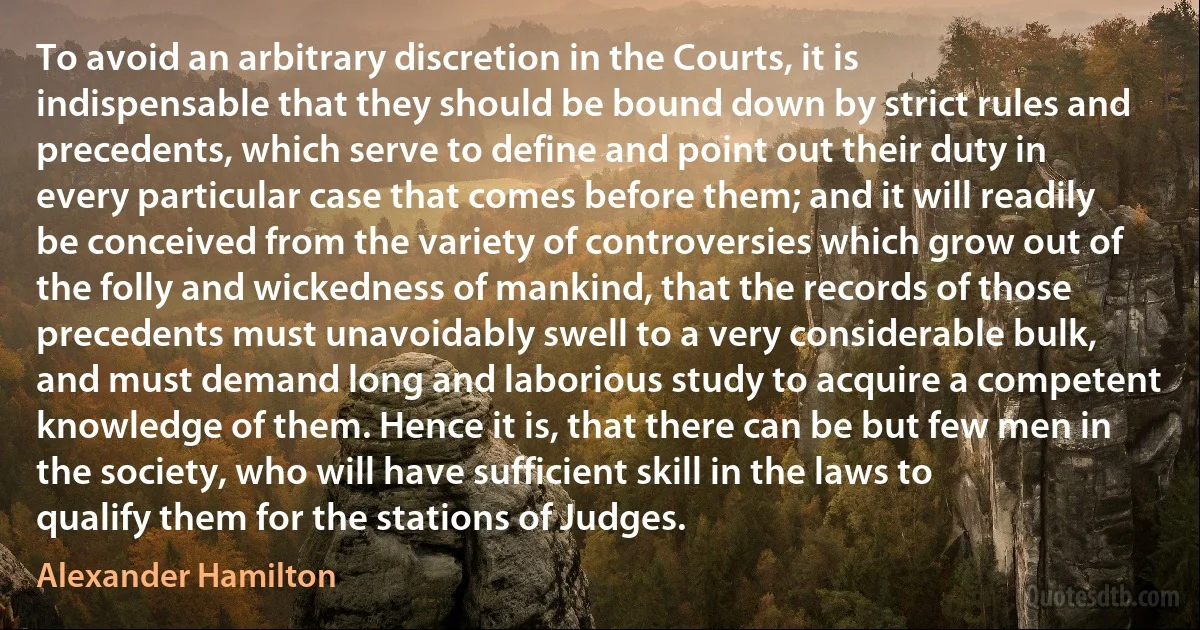Considerable Quotes - page 12
People who are given opiates after operations - sometimes for days - do not become addicts in the sense that I'm talking about. Moreover, it's been shown that heroin addicts have to make considerable efforts - in other words to be determined - to become addicts, and addicted; and on average it takes them about a year or so. In other words, heroin does not hook them, they hook heroin. And this, I think should suggest, is a typical example of the way that when we think about social problems, or the way many of us think about social problems, we ascribe agency not to agents but to inanimate objects and substances, and forces.

Anthony Daniels (psychiatrist)
It quickly becomes apparent to any person who has considerable experience with classified material that there is massive overclassification and that the principal concern of the classifiers is not with national security, but rather with governmental embarrassment of one sort or another.

Erwin Griswold
Some have thought that Wittgenstein's lectures were only for his friends and favourites. In fact he would admit anyone to his lectures. He required, however, that they should attend continuously and for a considerable period of time. He would not allow anyone to come for only one or two meetings. To one such request he replied, 'My lectures are not for tourists.

Norman Malcolm
The case had caused considerable excitement among the "believers” (Mu'mins) and interest among the "infidels” (KAfirs) in April-May, 1985. The press in India and abroad gave many headlines to what was rightly regarded as an unprecedented event in the history of religion. It was the first time that a Pagan had questioned the character of a document hailed as the very Word of God by a People of the Book. The roles now stood reversed. So far it had been the privilege of the Peoples of the Book to ban and burn the sacred literature of the Pagans.

Sita Ram Goel
Three conclusions can be safely drawn from a study of these 21 inscriptions. Firstly, the destruction of Hindu temples continued throughout the Muslim rule, from the date of its first establishment at Delhi in AD 1192 to its downfall with the death of the Mughal emperor Muhammad Shah in 1748. Secondly, the destruction took place all over India and was undertaken by rulers belonging to all Muslim dynasties, imperial as well as provincial. Thirdly, the destruction had no economic or political motive as has been proposed by Marxist scholars and Muslim apologists; it was inspired by religious zeal and regarded as a pious performance by Muslim kings and commanders, all of whom took considerable pride in it and sought blessing from Allãh and the Prophet. The iconoclasts, it may be added, have been idolised all along as paragons of faith, virtue, justice and generosity. These conclusions become clearer still when we come to evidence from Islamic literary sources.

Sita Ram Goel
Muslim historians, in India and abroad, have written hundreds of accounts in which the progress of Islamic armies across the cradle of Hindu culture is narrated, stage by stage and period by period. A pronounced feature of these Muslim histories is a description-in smaller or greater detail but always with considerable pride-of how the Hindus were slaughtered en masse or converted by force, how hundreds of thousands of Hindu men and women and children were captured as booty and sold into slavery, how Hindu temples and monasteries were razed to the ground or burnt down, and how images of Hindu Gods and Goddesses were destroyed or desecrated. Commandments of Allah (Quran) and precedents set by the Prophet (Sunnah) are frequently cited by the authors in support of what the swordsmen and demolition squads of Islam did with extraordinary zeal, not only in the midst of war but also, and more thoroughly, after Islamic rule had been firmly established.

Sita Ram Goel
My own conviction is that if the transfer cannot be made without civil war, it cannot be made at all, and that there is a reasonable probability that, if the government is supported by a considerable majority of citizens and if it is re-enforced by a powerful labor movement and cooperative movement, the change may be brought about without armed resistance from the owning class. The program that I have outlined is, of course, that of the Socialist Party of America, although not all Socialists will agree with everything that I have written.

Kirby Page
Freud very rightly brought his critical faculties to bear upon the dream. It is, in fact, inadmissible that this considerable portion of psychic activity (since, at least from man's birth until his death, thought offers no solution of continuity, the sum of the moments of the dream, from the point of view of time, and taking into consideration only the time of pure dreaming, that is the dreams of sleep, is not inferior to the sum of the moments of reality, or, to be more precisely limiting, the moments of waking) has still today been so grossly neglected.

André Breton
Clearly, I would be lying if I said I do not have a bank account in Europe; I do. I would be lying if I said I do not have considerable money in my account; I do. Yes, I do have a fair amount of money. However, I would estimate it to total less than 50 million dollars. What is that for twenty-two years as head of state in such a big country?

Mobutu Sésé Seko
We are a small nation. Our military strength in proportion to the mighty armaments of modern nations can never be considerable. Our strength as a nation will depend upon our economic freedom, and upon our moral and intellectual force. In these we can become a shining light in the world.

Michael Collins (Irish leader)
To cherish and stimulate the activity of the human mind, by multiplying the objects of enterprise, is not among the least considerable of the expedients, by which the wealth of a nation may be promoted. Even things in themselves not positively advantageous, sometimes become so, by their tendency to provoke exertion. Every new scene, which is opened to the busy nature of man to rouse and exert itself, is the addition of a new energy to the general stock of effort.

Alexander Hamilton
Social changes of this sort are made possible among considerable masses of people, by two ironies of human nature. The first is that almost everyman's life has been sufficiently patchy and full of possibilities for him to remember _some_ movement of his own mind towards what has become the movement of the time. The second is that he almost always makes a false picture of his past, and fosters a fictitious memory, whereby that detail seems in retrospect to dominate his career.

G. K. Chesterton
Men can enjoy life under considerable limitations, if they can be sure of their limited enjoyments; but under Progressive Puritanism we can never be sure of anything. The curse of it is not limitation; it is unlimited limitation. The evil is not in the restriction; but in the fact that nothing can ever restrict the restriction.

G. K. Chesterton
The truth is that it is our attitude towards children that is right, and our attitude towards grown-up people that is wrong. Our attitude towards our equals in age consists in a servile solemnity, overlying a considerable degree of indifference or disdain. Our attitude towards children consists in a condescending indulgence, overlying an unfathomable respect.

G. K. Chesterton



